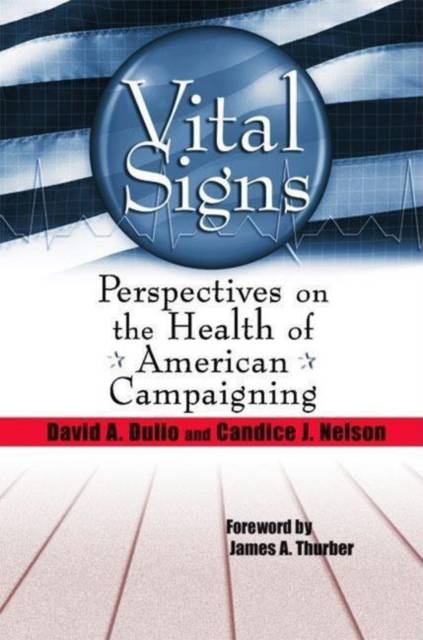
- Afhalen na 1 uur in een winkel met voorraad
- Gratis thuislevering in België
- Ruim aanbod met 7 miljoen producten
- Afhalen na 1 uur in een winkel met voorraad
- Gratis thuislevering in België
- Ruim aanbod met 7 miljoen producten
Vital Signs
Perspectives on the Health of American Campaigning
David A Dulio, Candice J NelsonOmschrijving
It was the best of elections; it was the worst of elections. The 2004 presidential contest mobilized a record number of voters, with 121 million Americans showing up at the polls. But in many eyes, the 2004 race also plumbed new depths. It was the most expensive presidential election in history, with a price tag of $2.2 billion. It was also marked by unprecedented negativity--for example, both George W. Bush and John Kerry came under fire for their activities during the Vietnam War, which ended three decades ago. In V ital Signs, David Dulio and Candice Nelson analyze the Bush and Kerry campaigns and use them as the springboard for a broader exploration of the current U.S. campaign system and its strengths and weaknesses. The book addresses four key issues: Who's in charge of modern campaigns? How effective are the key players? What role does money play? And are campaigns being conducted in an ethical manner? In answering these questions, Dulio and Nelson draw on a wide range of sources, including focus groups, interviews with campaign professionals, and a unique dataset based on multiple surveys of political consultants, party operatives, and the public. The culmination of the seven-year ""Improving Campaign Conduct"" project, Vital Signs should become an integral part of the debate about American campaigns and elections.
"Specificaties
Betrokkenen
- Auteur(s):
- Uitgeverij:
Inhoud
- Aantal bladzijden:
- 240
- Taal:
- Engels
Eigenschappen
- Productcode (EAN):
- 9780815719519
- Verschijningsdatum:
- 30/08/2005
- Uitvoering:
- Paperback
- Formaat:
- Trade paperback (VS)
- Afmetingen:
- 154 mm x 227 mm
- Gewicht:
- 353 g

Alleen bij Standaard Boekhandel
Beoordelingen
We publiceren alleen reviews die voldoen aan de voorwaarden voor reviews. Bekijk onze voorwaarden voor reviews.












